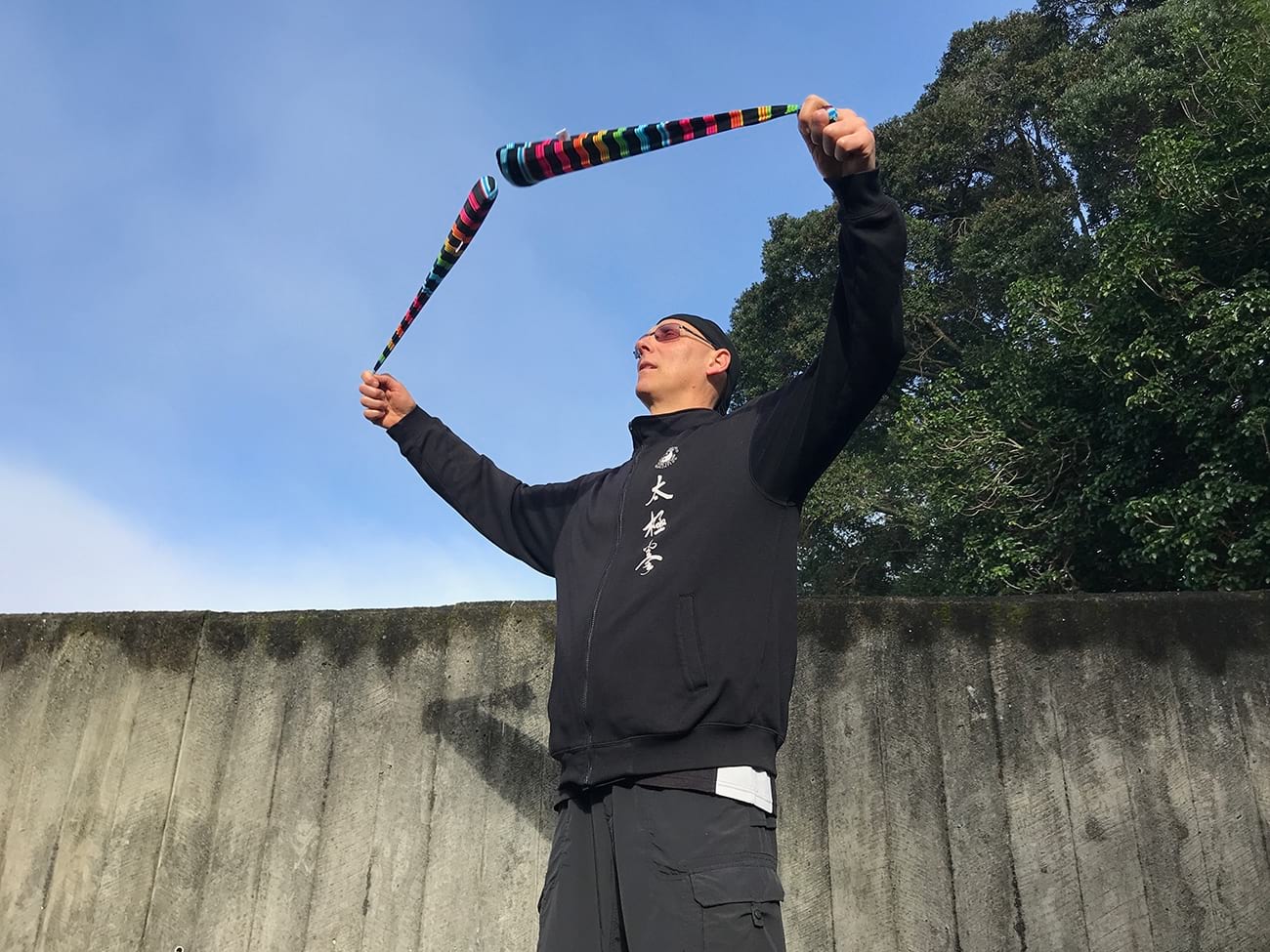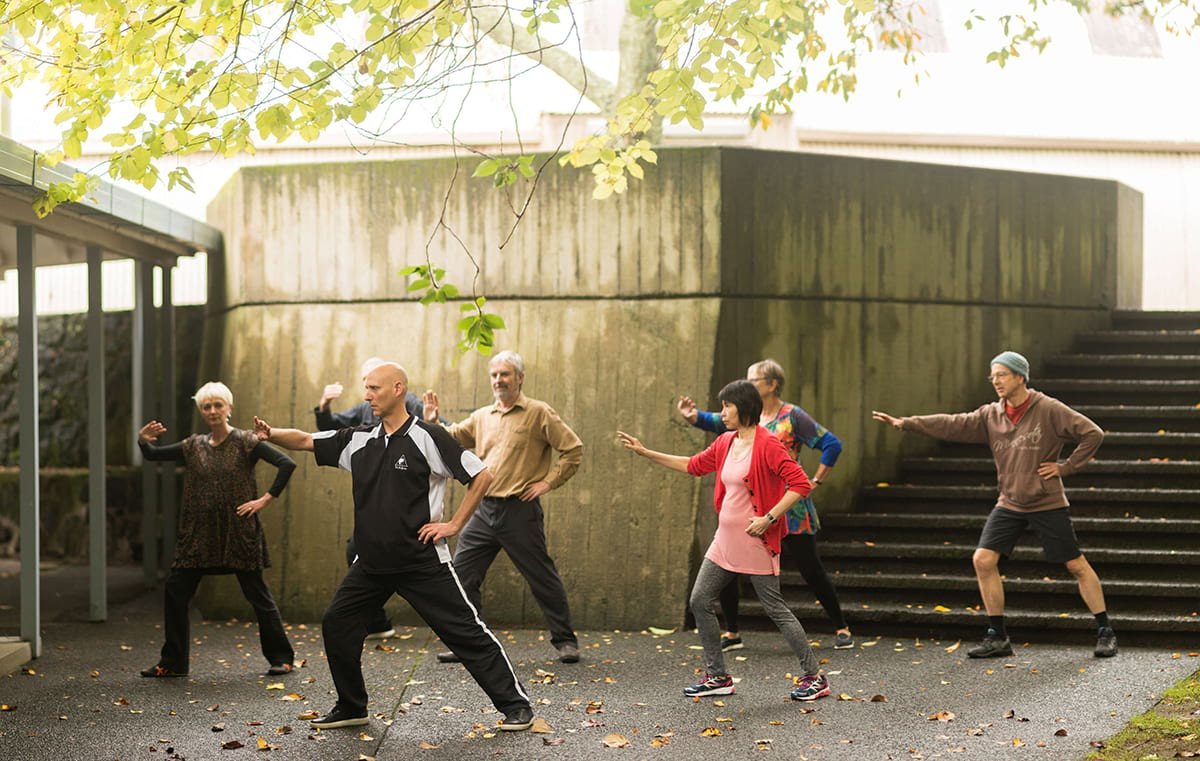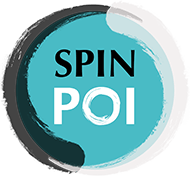Poi from a Tai Chi Perspective
An interview with Bruno Rubini

The following is a transcript from an interview with Bruno Rubini, a Tai Chi instructor and practitioner in New Zealand who worked with Dr. Kate Riegle van West on the first clinical trial on poi, Tai Chi, and wellbeing. In this interview Bruno reflects on the two disciplines and his experience starting out with poi.
What is Tai Chi?
Tai Chi has been practised in China for centuries as a martial art, as a physical and mental exercise and as meditation in motion. The purpose of it is being here, getting the whole triangle going of the mind, body, soul connection. People realize they have two parts [brain and body], but the hardest one is the third one, realizing that you are life, you are existence. It may seem as though life is separate from you, but you can start to see that you are part of the tree, part of the grass, that oneness. So the definition of Tai Chi actually evolves depending on the level you are at. At first it may be a martial art, then it may be something more, a meditation. So it’s really very hard to define. You can see it as whatever you want to.
What is Qi Gong?
Qi gong is you becoming aware of that energy that you are. You can do it sitting down, you can do it standing. So it’s really an awareness thing. Tai Chi goes a bit more into the moving and applying that feeling to what you do.
How long have you been practicing and teaching Tai Chi?
I started meditation, you could say in general, when I was 5. Five years later when I was doing archery, which is meditation as well, I realized that I needed to have a lot of awareness. So then I stated to understand the word “qi gong” in archery, and to be present and all that. When I really went into Tai Chi I was 12 or 13 years old. I really liked the whole idea of the movements, the slowness and the walking very slowly. I started teaching archery students when I was around 20, and then slowly gave up all my jobs because I realized that Tai Chi was it, and I wanted to pass it on and to help people. So when I was around 30 I started doing that full time.

What did you think of poi the first time you saw it?
When I first saw poi I thought it must be very good for you, but that it was very different from Tai Chi. With Tai Chi you’re working on the parasympathetic nervous system, so you have to do things very slowly and breathe, and the slower you go the better it is. Because I didn’t really know what poi was, I could only try to imagine that it was similar to Tai Chi in a way, because you are trying to get the brain going. But Tai Chi is really specific because it’s slowing down the movements. Then when I started doing poi I realized that there is a zone, and then it’s not words any more. Suddenly when you hit the zone you realize, well, this is the zone, and the zone isn’t anything, in a sense. So I started to realize the tremendous benefits you get of awareness, focus, and presence. And that is the ultimate goal in Tai Chi. So it is the same in a way. Even if you’re doing things that are very fast, for example chopping vegetables when you’re cooking, there has to be a skill level. The Chinese call it “kung fu”, meaning to create skill. It’s total awareness of yourself as you’re chopping quickly. I started to realize that poi can do that. And as I started to do poi more and more, I would watch my mind. Just watch what I’m doing, like I used to do with archery. And then I started to really love it. It’s almost like the universe is talking to you, like your consciousness is trying to show you how to do it, but you can stay totally still and open. It’s like the gate opens and then you can learn. And that’s what I like.
What about the rhythm of poi and Tai Chi… poi is intrinsically rhythmic; would you say Tai Chi has a rhythm to it as well?
You can see synchronicity and rhythm in silk reeling. If a person can get through first thinking ‘oh this is a bit boring, circles and circles’ then they can try to find the rhythm in themselves. The rhythm with their breath. With the poi it’s the same. There is an amazing feeling when the thing is spinning, just going around, it becomes alive. And when you get it all synchronized it feels like you are taking medicine almost, it feels like your brain is growing properly some how. With Tai Chi it’s the same, when you are doing a certain movement, or you do the 24 steps in perfect harmony, you feel that.
And what about the aspect of play? Poi is known as form of play, it’s done for its own sake with a focus on the process rather than an end goal. Would you say Tai Chi is a form of play too?
It’s interesting because in China they they don’t say “let’s do some Tai Chi”, they actually say “let’s play some Tai Chi”. To do Tai Chi is to play. If you are going to make it a “doing” then you’ve already got the wrong attitude. But people have a connection with meditation as a serious thing, unfortunately. It’s something you do when you get older, when you get serious, when you are trying to recover from injuries. It looks serious too. So we lost the joy in life. With the Tai Chi weapons play comes back in a little bit because then you have a toy you could say, like the sword or the fan. So the weapons are important and I think doing poi is like bringing the weapons in straight away.
What are you working on now with your poi practice?
Visualization is what I am trying to apply now to poi. When I can’t do a movement then I wrap the poi in both hands and I try to do it slow, like slow motion. I try to visualize the poi going around, its coming up this way, now it’s going behind me, and I visualize it and I stop time. You find Tai Chi stops time because you’re going so slow. But with poi you have to actually stop time in a different way, which is more exciting, because it is going fast. And it’s amazing because you can almost stop it. And it’s not only about doing it, but it’s about being patient. Because if you’re patient there is a stillness. That’s what I can do with Tai Chi now. I can be still. And if I am hitting myself with poi it doesn’t matter, there is a stillness I can find in doing it until suddenly it starts to work.
The interview was conducted by Kate Riegle van West, Founder of SpinPoi.
